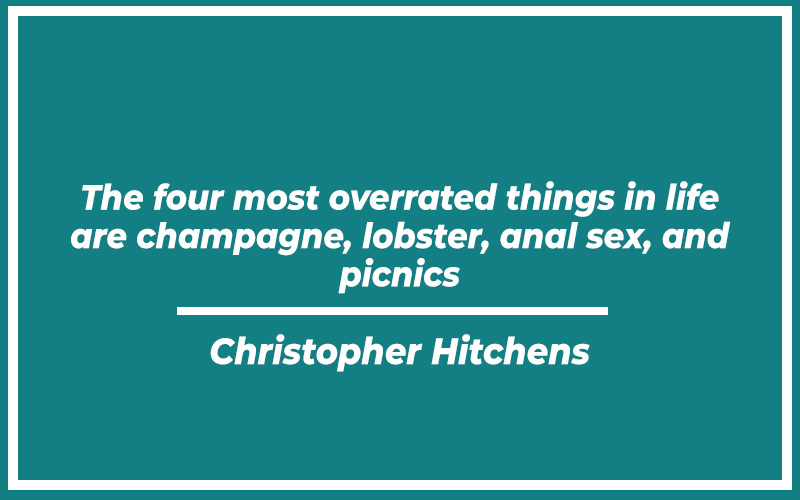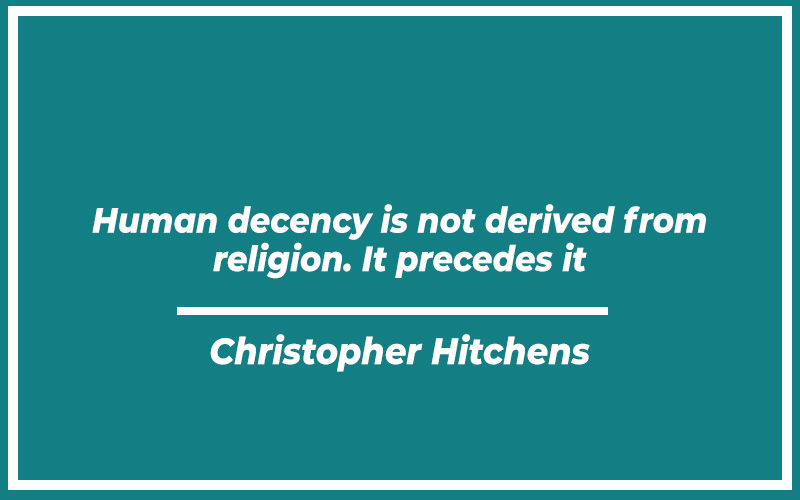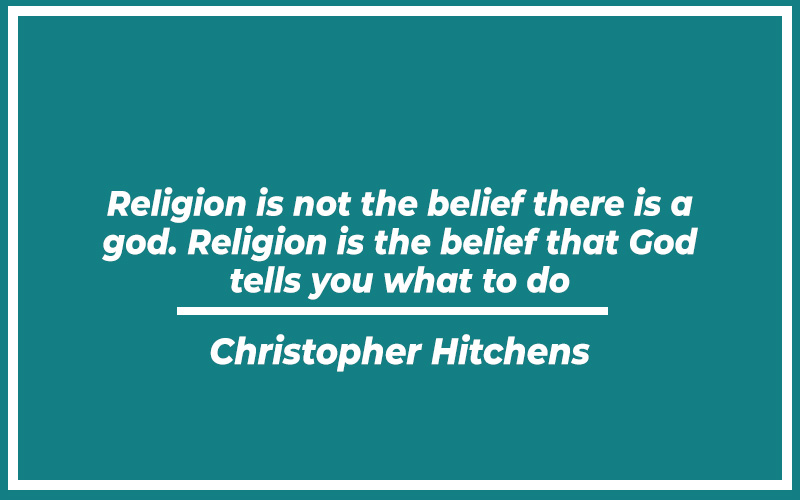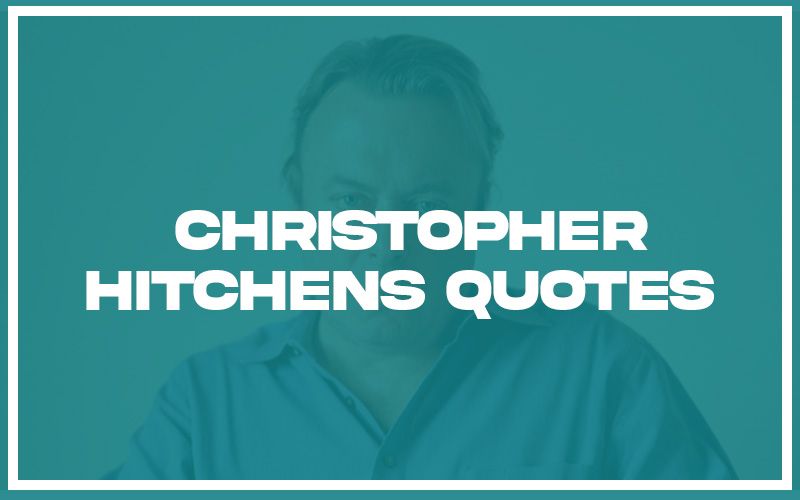Christopher Hitchens was a journalist, public intellectual and an author of 18 books on politics, faith, literature and culture. He tackled complex issues with a clear and direct voice, often challenging conventional wisdom and advocating for social justice.
If you want to know more about his opinions on politics, human rights, and the importance of independent thought, these quotes are for you.
Christopher Hitchens Quotes

“The four most overrated things in life are champagne, lobster, anal sex, and picnics.” – Christopher Hitchens
Hitchens delivers a characteristically provocative and humorous take on commonly celebrated experiences. This quote underscores his penchant for challenging popular opinions and societal norms. For readers, it serves as a humorous reminder to critically evaluate what society often deems desirable.
His perspective encourages individuals to question mainstream values and find personal significance in their preferences and experiences, rather than blindly following societal trends.
“Time spent arguing is, oddly enough, almost never wasted.” – Christopher Hitchens
Hitchens highlights the value of debate and intellectual exchange, even when it appears unproductive. This quote underscores his belief in the importance of discourse for personal and collective growth. For readers, it serves as an encouragement to engage in thoughtful argumentation.
His perspective advocates for the intellectual and educational benefits of engaging in meaningful discussions, promoting a culture of active, critical thinking.
“A good liar must have a good memory.” – Christopher Hitchens
Hitchens succinctly points out the practical challenge of maintaining deceit. This quote underscores the complications and pitfalls of dishonesty. For readers, it serves as a reminder of the value of honesty and the inherent difficulties in sustaining lies. It reflects Hitchens’ commitment to truth and integrity.
His perspective encourages individuals to value and practice honesty, understanding that deceit requires constant vigilance and can easily unravel. This promotes a more straightforward and truthful approach to interactions and personal conduct.
“You have to choose your future regrets.” – Christopher Hitchens
Hitchens presents a pragmatic view on decision-making, acknowledging that every choice comes with potential regrets. This quote underscores the inevitability of imperfection in life’s decisions.
It reflects Hitchens’ realistic approach to life, emphasizing personal responsibility and the importance of informed decision-making. His perspective encourages individuals to weigh their options carefully, understanding that living a full life involves making decisions that may later be regretted.
“Well, I’m not sure what the future holds, but I do know that I’m going to be a part of it.” – Christopher Hitchens
Hitchens expresses a forward-looking perspective, emphasizing his intention to remain engaged and influential. This quote underscores his confidence and commitment to active participation in future developments.
His perspective encourages individuals to remain proactive and involved in shaping their own futures and the broader societal landscape, promoting a sense of agency and responsibility.
“If you want to get rich from writing, write the sort of thing that’s read by people who move their lips when they’re reading to themselves.” – Christopher Hitchens
Hitchens humorously critiques the commercial aspects of writing, suggesting that simplicity and mass appeal often lead to financial success. This quote underscores the tension between artistic integrity and commercial viability.
For readers, it provides a candid perspective on the realities of the writing industry. It reflects Hitchens’ awareness of market dynamics and his often sardonic take on popular culture.
“The one thing that the racist can never manage is anything like discrimination: he is indiscriminate by definition.” – Christopher Hitchens
Hitchens highlights the inherent contradiction in racism, noting that it lacks true discernment or discrimination. This quote underscores the irrationality and blanket judgment involved in racist ideologies. For readers, it serves as a reminder of the intellectual and moral failures of racism.
It reflects Hitchens’ commitment to exposing the fallacies in prejudiced thinking and advocating for rational, inclusive perspectives.
“To ‘choose’ dogma and faith over doubt and experience is to throw out the ripening vintage and to reach greedily for the Kool-Aid.” – Christopher Hitchens
Hitchens critiques the preference for dogma over critical inquiry, using a vivid metaphor to illustrate his point. This quote emphasizes the value of doubt and personal experience in developing a mature understanding.
For readers, it warns against the allure of easy answers provided by rigid belief systems. It reflects Hitchens’ advocacy for intellectual growth and skepticism, encouraging a more nuanced and experiential approach to life.
“There can be no progress without head-on confrontation.” – Christopher Hitchens
Hitchens asserts that meaningful progress often requires direct and sometimes uncomfortable challenges to existing norms. For readers, it serves as a call to engage boldly with difficult issues rather than avoiding them. It reflects Hitchens’ belief in the power of debate and conflict to foster growth and change.
His perspective encourages individuals to face challenges head-on, promoting a proactive and courageous approach to personal and societal improvement.

“Human decency is not derived from religion. It precedes it.” – Christopher Hitchens
Hitchens argues that morality and decency are intrinsic to human nature, not dependent on religious teachings. This quote challenges the notion that religion is the source of ethical behavior.
His perspective encourages a view of morality that is independent of religious doctrines, advocating for a more universal and human-centered understanding of ethical conduct.
“The measure of an education is that you acquire some idea of the extent of your ignorance.” – Christopher Hitchens
Hitchens highlights the humbling realization that true education brings about the recognition of one’s own limitations. This quote underscores the importance of intellectual humility and continuous learning.
His perspective encourages individuals to remain curious and open-minded, acknowledging that understanding the limits of one’s knowledge is a critical step in the quest for deeper insight and truth.
“Everybody does have a book in them, but in most cases, that’s where it should stay.” – Christopher Hitchens
Hitchens wryly comments on the common belief that everyone has a story worth publishing, suggesting that not all should be written. This quote humorously critiques the overestimation of one’s literary potential. For readers, it provides a candid perspective on the realities of writing and publishing.
His perspective encourages a more thoughtful consideration of what makes a story worth telling, emphasizing the importance of substance and skill in writing.
“If you gave [Jerry] Falwell an enema, he could be buried in a matchbox.” – Christopher Hitchens
Hitchens uses sharp wit to criticize Jerry Falwell, implying his contributions are insubstantial. This quote showcases Hitchens’ biting humor and his disdain for figures he viewed as hypocritical.
For readers, it highlights his talent for succinctly and humorously expressing contempt. It reflects Hitchens’ ability to blend humor with critique, making serious points through pointed satire.
Also Read: Top K-Pop Quotes (with Explanation)
“The only position that leaves me with no cognitive dissonance is atheism.” – Christopher Hitchens
Hitchens articulates his stance on atheism as the most intellectually satisfying position. This quote underscores his commitment to rationalism and his rejection of belief systems that he found contradictory.
For readers, it highlights the importance of coherence in one’s beliefs. It reflects Hitchens’ dedication to a worldview grounded in evidence and reason, encouraging others to seek clarity and consistency in their own philosophical perspectives.
“To be against tobacco is not to be for health.” – Christopher Hitchens
Hitchens points out that opposing one vice does not equate to promoting overall well-being. This quote challenges simplistic thinking and underscores the complexity of public health debates.
For readers, it serves as a reminder to consider broader contexts and not reduce issues to binary oppositions. It reflects Hitchens’ nuanced understanding of societal issues and his ability to dissect and critique them thoughtfully.
“Exceptional claims demand exceptional evidence.” – Christopher Hitchens
Hitchens emphasizes the necessity for rigorous proof when evaluating extraordinary assertions. This quote is a cornerstone of skeptical inquiry and critical thinking.
For readers, it underscores the need to demand substantial evidence for significant claims. This principle is crucial for maintaining intellectual integrity and ensuring that beliefs and claims are grounded in robust, verifiable evidence.
“The Bible may, indeed does, contain a warrant for trafficking in humans, for ethnic cleansing, for slavery, for bride-price, and for indiscriminate massacre; but we are not bound by any of it because it was put together by crude, uncultured human mammals.” – Christopher Hitchens
Hitchens critiques the moral and ethical content of the Bible, questioning its relevance to modern values. This quote challenges readers to reconsider the authority and applicability of ancient texts in contemporary society. It reflects Hitchens’ broader critique of religious texts as historical documents shaped by their times rather than divine edicts.
His analysis encourages a critical evaluation of religious doctrines and their impact on current ethical and social norms, advocating for progress and enlightenment.
“Faith is the surrender of the mind; it’s the surrender of reason, it’s the surrender of the only thing that makes us different from other mammals.” – Christopher Hitchens
Hitchens argues that faith undermines human rationality and critical thinking, which he sees as our defining traits. This quote underscores his belief in the primacy of reason over blind faith.
For readers, it highlights the tension between religious belief and intellectual independence. It reflects Hitchens’ conviction that human progress and enlightenment depend on the exercise of reason and skepticism.
“The term ‘the American way’ has become a euphemism for keeping the lid on and managing dissent.” – Christopher Hitchens
Hitchens critiques the notion of the “American way,” suggesting it has come to mean suppressing opposition and maintaining control. This quote challenges patriotic rhetoric by exposing underlying power dynamics.
For readers, it invites a critical examination of national identity and political practices. It reflects Hitchens’ skepticism towards political slogans and his commitment to uncovering uncomfortable truths.
“Beware the irrational, however seductive. Shun the ‘transcendent’ and all who invite you to subordinate or annihilate yourself.” – Christopher Hitchens
Hitchens warns against the allure of irrational beliefs and ideologies that demand self-subjugation. This quote underscores his advocacy for personal autonomy and critical thinking.
For readers, it serves as a caution against blindly following charismatic leaders or seductive ideas that undermine individual freedom. It reflects Hitchens’ commitment to rationalism and self-determination, encouraging a skeptical and independent approach to life.
“That which can be asserted without evidence, can be dismissed without evidence.” – Christopher Hitchens
Christopher Hitchens succinctly captures a fundamental principle of critical thinking and skepticism with this quote. It underscores the importance of evidence in forming and validating claims.
For readers, it serves as a reminder to question assertions and seek proof before accepting beliefs or statements. This quote reflects Hitchens’ commitment to rational discourse and his challenge to unsubstantiated claims, promoting a culture of reason and critical inquiry that is essential in intellectual and everyday debates.
“The essence of the independent mind lies not in what it thinks, but in how it thinks.” – Christopher Hitchens
Hitchens emphasizes the value of independent thought by focusing on the process rather than the content of thinking. This quote highlights the importance of critical thinking skills and the ability to evaluate information objectively.
For readers, it serves as a call to cultivate intellectual independence and resist conformist thinking. It reflects Hitchens’ belief in the power of reason and analysis, encouraging individuals to develop a thoughtful and discerning approach to knowledge and beliefs.
“What can be asserted without evidence can be dismissed without evidence.” – Christopher Hitchens
This quote by Hitchens reinforces the principle that unfounded claims do not warrant serious consideration. It underscores the necessity of evidence in supporting assertions and maintaining intellectual integrity.
For readers, it highlights the importance of skepticism and the need to demand proof for extraordinary claims. It reflects Hitchens’ dedication to promoting rational discourse and challenging dogma, encouraging a culture of inquiry and evidence-based belief systems that strengthen critical thinking.
“Take the risk of thinking for yourself, much more happiness, truth, beauty, and wisdom will come to you that way.” – Christopher Hitchens
Hitchens advocates for the personal and intellectual rewards of independent thinking. This quote encourages individuals to embrace the uncertainties and challenges of forming their own opinions.
For readers, it serves as an empowering reminder of the benefits of intellectual autonomy. It reflects Hitchens’ belief in the transformative power of self-reliance in thought, suggesting that true fulfillment and enlightenment come from questioning norms and exploring ideas independently.
“To terrify children with the image of hell, to consider women an inferior creation—is that good for the world?” – Christopher Hitchens
Hitchens critiques religious doctrines that instill fear and promote inequality. This quote challenges the ethical implications of using fear as a tool for control and perpetuating gender discrimination.
For readers, it raises important questions about the moral impact of religious teachings. It reflects Hitchens’ commitment to social justice and his critique of doctrines that he views as harmful. This quote encourages a critical examination of the values and beliefs that shape society, advocating for a more humane and equitable world.
“Owners of dogs will have noticed that, if you provide them with food and water and shelter and affection, they will think you are God. Whereas owners of cats are compelled to realize that, if you provide them with food and water and shelter and affection, they draw the conclusion that they are God.” – Christopher Hitchens
With his characteristic wit, Hitchens contrasts the attitudes of dogs and cats to their owners, offering a humorous observation on pet behavior. This quote highlights Hitchens’ ability to blend humor with insight.
For readers, it provides a light-hearted reflection on the differing natures of pets and their relationships with humans. It reflects Hitchens’ keen observational skills and his talent for drawing broader implications from everyday experiences, adding a touch of levity to his often serious commentary.

“Religion is not the belief there is a god. Religion is the belief that God tells you what to do.” – Christopher Hitchens
Hitchens distinguishes between belief in a deity and the dogmatic instructions often associated with religion. This quote critiques the prescriptive nature of religious doctrines.
For readers, it prompts reflection on the difference between personal faith and institutionalized religion. It reflects Hitchens’ critical stance on organized religion and his advocacy for individual freedom of thought.
Also Read: Top K-Pop Quotes (with Explanation)
Final Thoughts
Christopher Hitchen’s words are not always comfortable, but they definitely challenge us to us to engage in open debate and defend our own convictions.
So let that be something to ponder about. As far as it is not an intent to hurt or slander, always advocate and stand for what you believe in, even if it means swimming against the current.

